
I know; I’m a bit behind the times on this one. I totally forgot that I’d never written up/posted our take on Frozen after we saw it. But I can’t let this one slide, because I was so impressed.
I’d been hearing mixed things about it. I’d heard some people say it was great. I’d also heard some people complain that it was homosexual propaganda. Being the secular company that Disney is, you never know. So I was…wary going into it. But I have to say that whomever called it homosexual propaganda is off his rocker. It’s absolutely not. This is hands-down the best movie Disney has produced in at least ten years. Maybe ever.
True Love
Based on The Snow Queen (from Andersen’s Fairy Tales – I have no idea how loosely, because I’ve not read that), Frozen carries the theme of true love. But, amazingly, it gets it right! A young, foolish Anna believes that true love is all about the stuff of stories – swooning after handsome princes, “true love’s kiss,” and all that jazz. But then she’s informed, in no uncertain terms, that she doesn’t know anything about love. It is actually stated in the dialogue that “love is putting someone else’s needs before yours.” (Hopefully I quoted that right. It’s definitely the gist, anyway.)
Several characters demonstrate sacrificial love, most notably the character whose ultimate sacrifice forms the apex of the story. (I’ll leave it at that so I don’t totally spoil it for any of you who may still not have seen the movie.)
Wise Choices
The young female viewer will also learn that just because a guy comes in and sweeps her off her feet, that doesn’t necessarily mean he loves her. Those who will be there for you, and take care of you, are not always immediately obvious. But older family members who love us can sometimes see this more clearly than we can see it ourselves.
Fun Characters
I have to confess that I just love Anna’s character. We so often see “stuffy” princesses who are all prim and proper. There’s nothing wrong with these characters, in general, but if that’s all we see, it can subtly communicate that prim and proper – and quiet is the only okay way to be. So I love that Anna is different. She’s a princess, but she’s impetuous and, frankly, something of a walking disaster. But she’s so enthusiastic and full of life!
One of my favorite scenes is near the beginning, when the girls are little. Anna is trying to convince Elsa to get out of bed and come play with her. Elsa just wants Anna to go away and go back to sleep. Very dramatically, Anna says, “But I can’t go sleep! The sky is awake! So I am awake!” I just laughed and laughed, because her whole tone and demeanor sounded so much like the little girls in my house!
I like that my girls can see, in this character, that it’s okay for them to be them, even if it means that occasionally something gets knocked off a wall. We love them anyway, because they bring things to the table – like their zest for life – that the more serene and quiet don’t. (The serene and quiet are valuable, too; but they’ve been seeing that for years.)
Olaf is fun, too, for similar reasons. He has a childlike excitement about life. He’s delightfully naïve. And yet he has great wisdom to impart, as well. He also offers some comic relief, in a “physical comedy” sort of way.
Why People Claim the Movie is Homosexual Propaganda, and Why That’s Baloney
As far as I have seen, all of the complaints about Frozen as “homosexual propaganda” come back to one song. And if you hear the song in its context within the movie, that’s a ridiculous claim. Elsa (the “snow queen”) has the power to freeze things. She doesn’t know how to control it, but when she gets emotional, it really gets out of hand. So she’s been taught to hide this power, to ignore it.
When the song in question comes on (“Let it Go” – if you’re living and breathing in the U.S., chances are excellent that you’ve heard it at some point), she has fled town to an isolated location and decided that she’ll just be herself, quit trying to hide her power – because she can’t now, anyway – and be by herself where she can’t hurt anyone. She sings about having been taught to “conceal, don’t feel, don’t let them know” and about how “now they know.”
At a glance, this might seem like it parallels a homosexual “coming out of the closet,” but if you look closely at all, you see that it really doesn’t. She’s not happy/content. She’s not living “successfully” among people; she’s out on an isolated mountaintop all alone. She’s still out of control, and frustrated over it, even underneath the literal lines of her song. And she only really finds peace once she comes back to town and learns to restrain her power so she doesn’t hurt anyone.
Will homosexuals identify with the character through the song because of their homosexuality? Possibly. Maybe even probably. But others will identify, too, for other reasons. Those who are strongly introverted in families where everyone else is extroverted, for instance, may feel different because of that and will identify in that way (or vice versa). Any viewer who feels different or misunderstood for something will identify with Elsa because of that thing. That’s a sign of a well-written story, not of propaganda!
Our Conclusion
Definitely worth watching. In fact, this is one we’ll be looking to add to our collection as soon as possible. Here is what my oldest daughter took away from the movie:
I finally got to see Frozen. I liked that it had the right underlying message, true love is putting others’ needs before your own. I liked Anna because of her excitement and peppiness.
Elsa should have learned to control her powers rather than hide them. She could have done wonderful things if she had learned to control instead of conceal.
Part of the movie almost made me cry, I mean, poor Anna, she was separated from her sister when they had been best buddies, and they didn’t even tell her why, so she thought that Elsa didn’t like her anymore.
Watching Frozen made me realize how bad my relationship with my sister is, I realized that I want to fix that, that I don’t want to shut her out like Elsa did Anna.
(Completely unprompted. She wrote that before I even knew she was writing it.) When asked what the main message of the movie was, my six-year-old said, “the real meaning of love.” “Which is?” “Putting other people’s needs before your own.”
Fun Stuff
When you watch the movie, enjoy these activities provided by Disney (right-click and choose “save link as”):
Coloring Pages:
Mazes:
Other Activities:
Images & activity pages courtesy of Disney
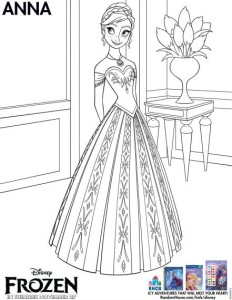
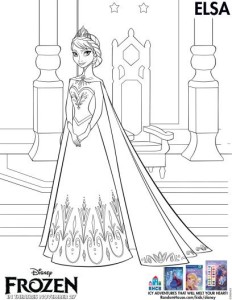
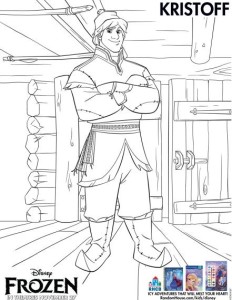
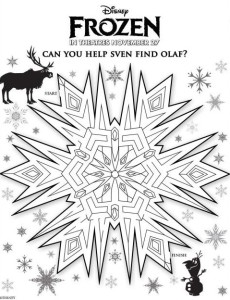
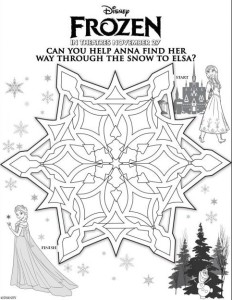
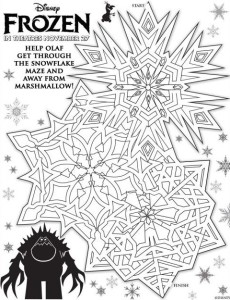

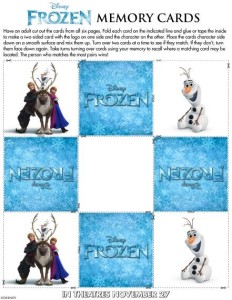
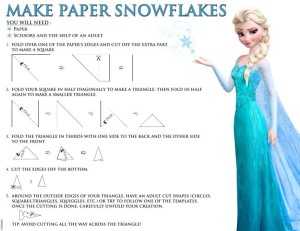
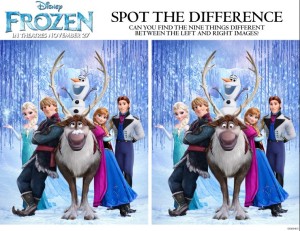
Leave a Reply